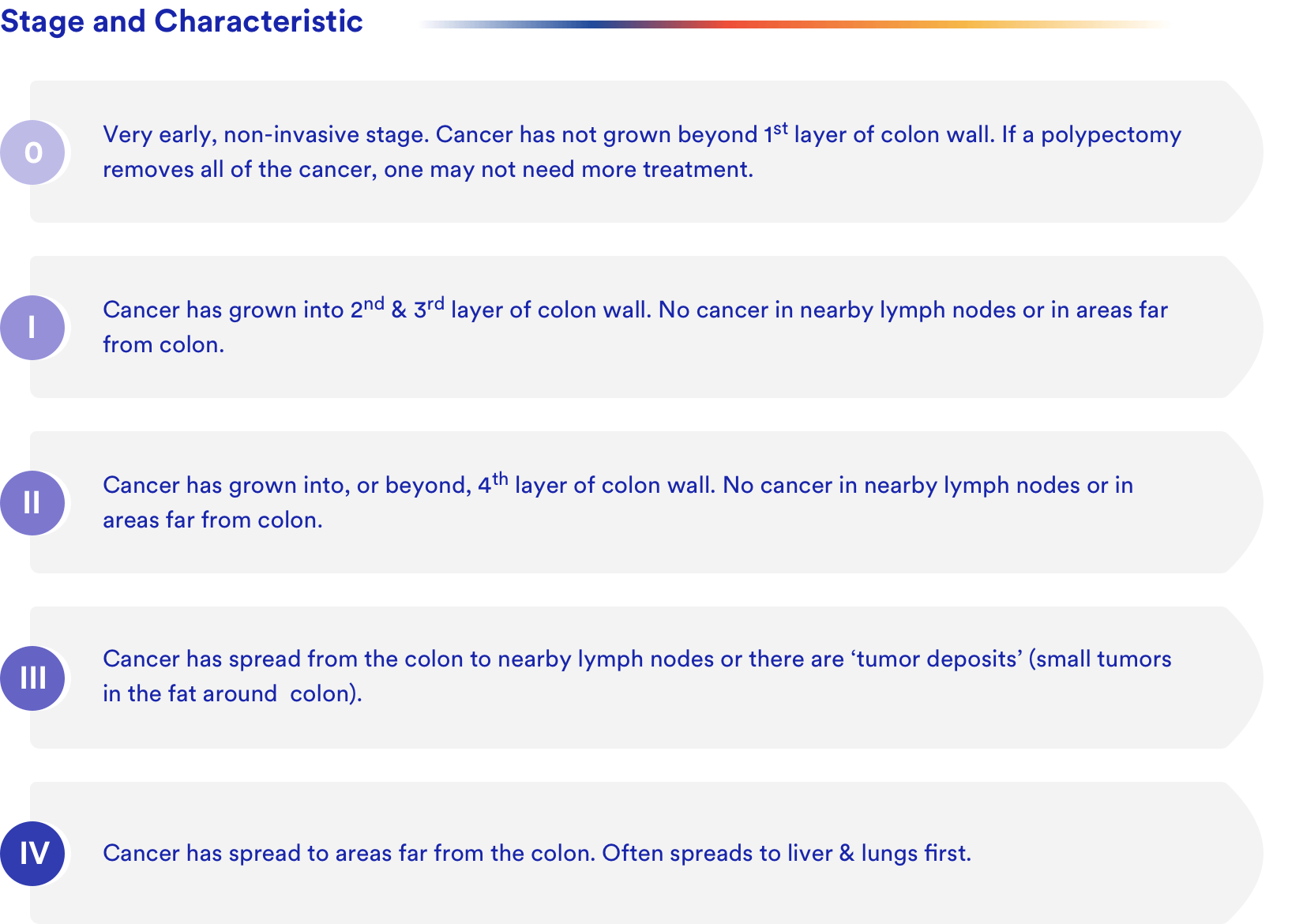
Metastatic Colorectal Cancer
How is colorectal cancer screened and diagnosed?
People with an average risk of CRC may consider screening approximately by age 50. But, those with an increased risk should consider screening sooner or as suggested by their doctor.
In most cases, colon cancer begins as small, noncancerous clumps of cells called ‘polyps’, at which stage, little or no symptoms are experienced. Over time some of these polyps can develop into cancer. This is the reason why regular screening is recommended to identify and remove polyps before they can turn into cancer.
But, how early should one start screening? People with an average risk of CRC may consider screening approximately by age 50. But, those with an increased risk should consider screening sooner or as suggested by their doctor. There exists several screening options, and consulting one’s doctor will help decide the most appropriate one. Colon cancer screening is broadly of 2 types:
I. Stool based tests
In these tests, the stool (feces) is checked for possible signs of cancer such as hidden blood or certain abnormal sections of DNA.
II. Visual exams
Visual exams include colonoscopy and CT colonography. In visual exams, the doctor examines the structure of the colon and rectum for any kind of abnormality. This is done with a tube-like aid (scope) fitted with a camera, inserted through the rectum or by X-ray imaging. Unlike stool based tests, visual exams may be invasive.
Any abnormal test result during screening is usually followed up with further intervention and/or other means of diagnosis, which are:
i. Diagnostic colonoscopy
During diagnostic colonoscopy, a long, flexible and slender tube is attached to a video camera and monitor to view your entire colon and rectum is inserted through the anus into the rectum and colon. If any suspicious areas are found, the doctor can surgically remove tissue samples for analysis and could even remove polyps. To know how far the cancer has spread, the doctor could also recommend additional diagnostic tools such as CT/MRI/PET/US scan.
ii. Proctoscopy
If rectal cancer is suspected, a doctor uses a ‘proctoscope’ to examine the interior of the rectum. A proctoscope is a thin, rigid, lighted tube with a small video camera attached to the end, with which the tumour can be seen, measured and its exact location determined.
iii. Biopsy
During biopsy, a small piece of tissue (or less often, a part of the colon) is removed with the aid of colonoscopy and sent to the lab to test for any abnormality.
iv. Blood test
Carcinoembryonic antigen (CEA) is an antigen produced and released into the bloodstream by some cancerous cells, especially that of the large intestine and rectum. Hence, detecting CEA in the blood (‘CEA test’) can help diagnose these type of cancers.
v. Genetic test
For those with a strong family history of CRC, a genetic counselor can help assess one’s likelihood of having colorectal cancer. He/she could also help decide whether a genetic testing would be right for the moment. Genetic tests can also help show if one has inherited a high risk gene due to inherited disorders. To know more, click here.
How can one know how far cancer would have progressed?
Cancer staging is a measure or rating of how far the cancer would have progressed. The AJCC (American Joint Committee on Cancer) TNM (Tumour, Node, metastasis) system is recommended to stage colon cancer. As per this, the doctor will stage colon cancer as follows:
Abbreviations
AJCC: American Joint Committee on Cancer CEA: Carcinoembryonic antigen CRC: Colorectal cancer CT scan: Computed Tomography scan DNA: Deoxyribonucleic acid FOLFIRI: folinic acid, fluorouracil and irinotecan FOLFOX: Folinic acid, fluorouracil and oxaliplatin IBD: Inflammatory bowel disease NCCN: National Comprehensive Cancer Network MRI scan: Magnetic resonance imaging scan PET scan: Positron emission tomography scan TNM: Tumor, Node, Metastasis US scan: Ultrasound scan
References
- Bray, F., Ferlay, J., Soerjomataram, I., Siegel, R. L., Torre, L. A., & Jemal, A. (2018). Global cancer statistics 2018: GLOBOCAN estimates of incidence and mortality worldwide for 36 cancers in 185 countries. CA: A Cancer Journal for Clinicians, 68(6), 394-424. doi:10.3322/caac.21492
- What is Colorectal Cancer, American Cancer Society, https://www.cancer.org/cancer/colon-rectal-cancer/about/what-is-colorectal-cancer.html, Accessed on 12.06.2019
- Source: NCCN Guidelines for patients®. Colon cancer, 2018; Available from: https://www.nccn.org/patients/guidelines/colon/files/assets/common/downloads/files/colon.pdf
- Botteri, E., Iodice, S., Bagnardi, V., Raimondi, S., Lowenfels, A. B., & Maisonneuve, P. (2008). Smoking and Colorectal Cancer. JAMA, 300(23), 2765. doi:10.1001/jama.2008.839
- Cope, G. F., Wyatt, J. I., Pinder, I. F., Lee, P. N., Heatley, R. V., & Kelleher, J. (1991). Alcohol consumption in patients with colorectal adenomatous polyps. Gut, 32(1), 70-72. doi:10.1136/gut.32.1.70
- Levi, F., Pasche, C., Lucchini, F., & La Vecchia, C. (2001). Dietary fibre and the risk of colorectal cancer. European Journal of Cancer, 37(16), 2091-2096. doi:10.1016/s0959-8049(01)00254-4
- Frezza, E. E. (2006). Influence of obesity on the risk of developing colon cancer. Gut, 55(2), 285-291. doi:10.1136/gut.2005.073163
- Slattery, M. L. (2004). Physical Activity and Colorectal Cancer. Sports Medicine, 34(4), 239-252. doi:10.2165/00007256-200434040-00004
- Taylor, D. P., Burt, R. W., Williams, M. S., Haug, P. J., & Cannon–Albright, L. A. (2010). Population-Based Family History–Specific Risks for Colorectal Cancer: A Constellation Approach. Gastroenterology, 138(3), 877-885. doi:10.1053/j.gastro.2009.11.044
- Locker, G. Y., & Lynch, H. T. (2004). Genetic factors and colorectal cancer in Ashkenazi Jews. Familial Cancer, 3(3-4), 215-221. doi:10.1007/s10689-004-9547-x
- Colorectal Cancer Screening Tests, American Cancer Society, Available at: https://www.cancer.org/cancer/colon-rectal-cancer/detection-diagnosis-staging/screening-tests-used.html, Accessed on 28.05.2019
- Tests to diagnose and stage colorectal cancer, American Cancer Society, Available at: https://www.cancer.org/cancer/colon-rectal-cancer/detection-diagnosis-staging/how-diagnosed.html, Accessed on 28.05.2019
- Managing Side Effects, Available from: https://fightcolorectalcancer.org/fight/treatment/managing-side-effects/




